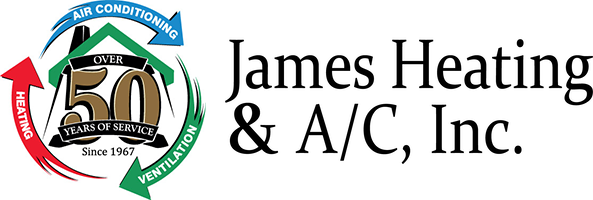
Purchasing your first home is thrilling. You’re probably trying to keep track of numerous details about making the right choice. We believe that gaining insight into your potential new HVAC system is vital. The property’s HVAC system represents a substantial investment and source of potential long-term costs, which is why due diligence helps all first-time homebuyers.
In the following guide, we’ll outline seven tips for discovering all there is to know about a home’s heating and cooling setup. And if you want a more in-depth opinion from the pros, feel free to call James Heating & A/C, Inc. Our experienced team can weigh in on your options with industry insights that are second to none.
1. What HVAC System Are You Working With?
Start by determining what type of HVAC system the home has. Furnaces tend to last longer than air conditioners, and some of the latest types of HVAC equipment like heat pumps feature average life spans that are impressively long. Getting the details on the make and specific model ensures you have a clear understanding of how much routine maintenance it might need.
2. How Long Ago Was the System Installed?
It’s just as smart to learn how old the HVAC system is when you're considering a new home. In general, HVAC systems tend to run for about 10-12 years. Having the knowledge of when it was installed helps you anticipate future maintenance needs or when it might shut down for good. Older systems are at a higher risk of problems, so budgeting for a replacement unit could be necessary sooner than you thought.
3. What Does the Warranty Cover?
Be sure to check the HVAC system is still under warranty. If it is, this can lower maintenance expenses. HVAC warranties should take care of parts and labor, but it's important to note that details will vary. Review any terms that aren’t familiar to ensure you understand your coverage and the likelihood of out-of-pocket costs.
4. Has the System Ever Been Professionally Serviced or Maintained?
Don't forget to check the maintenance history of the HVAC system, if the records are available. This kind of information can demonstrate if there have been regular problems or how much upkeep was provided. You should at least try to track down a history of key tasks such as changing the air filter, which can indicate it received regularly scheduled tune-ups.
5. What Are the Energy Efficiency Ratings?
Selecting a system with great energy efficiency isn’t just smart; it leads to smaller utility bills and a smaller environmental impact. Try and find the seasonal energy efficiency ratio (SEER) ratings for air conditioning as well as the annual fuel utilization efficiency (AFUE) for furnaces. High SEER ratings mean more efficient cooling throughout the season, while strong AFUE ratings illustrate that the fuel is efficiently converted into useable heat.
6. Can You Spot Trouble After Your Own Inspection?
Even without heating and cooling expertise, it's still a good idea to inspect the HVAC system on your own. Look for signs of problems that haven't been mentioned by the seller. This includes strange noises, stubborn patches of the house that are too hot or cold and attempts to cover up any obvious damage.
7. Have You Sought Out Expert Advice?
If you're not quite sure about the current state of the HVAC system, it's beneficial to get input from trained HVAC professionals. They will be much more likely to catch things you might not, like leaking coolant, damage to the wiring or damaged ductwork.
A Chat with James Heating & A/C, Inc Simplifies Your Home-Buying Journey
Selecting your first home ought to be exciting, and James Heating & A/C, Inc can ensure yours is too. Get in touch with us at 336-853-6070. We can talk about how our HVAC services give you peace of mind, giving you what you need to make an offer with confidence.

